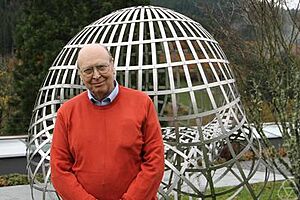Bob Vaughan facts for kids
Quick facts for kids
Robert Charles Vaughan
|
|
|---|---|

R. C. Vaughan at Oberwolfach in 2008
|
|
| Born | March 24, 1945 |
| Alma mater | University of London |
| Known for | Analytic number theory Exponential sums Hardy–Littlewood circle method |
| Awards | Berwick Prize (1979) Fellow of the Royal Society |
| Scientific career | |
| Fields | Mathematician |
| Institutions | Penn State Imperial College |
| Doctoral advisor | Theodor Estermann |
| Doctoral students | Trevor Wooley |
Robert Charles "Bob" Vaughan is a famous British mathematician. He was born on March 24, 1945. He is known for his work in a special area of math called analytic number theory. This field uses tools from analysis to study integers and prime numbers.
Contents
Robert Vaughan's Early Life and Education
Robert Vaughan started his journey in mathematics at University College London. He earned his first degree there in 1966. Later, he continued his studies at the University of London. In 1970, he completed his PhD, which is a very high degree in academics. His main teacher for his PhD was Theodor Estermann.
Robert Vaughan's Career in Mathematics
After finishing his PhD, Robert Vaughan worked as a researcher. He spent time at the University of Nottingham and the University of Sheffield. In 1972, he became a lecturer at Imperial College London. A lecturer is like a teacher at a university.
He quickly moved up in his career. By 1980, he became a full professor. From 1988 to 1990, he was even in charge of the Pure Mathematics section at Imperial College. Since 1999, Professor Vaughan has been teaching at Pennsylvania State University in the United States. He has also guided other students, like Trevor Wooley, who went on to earn their own PhDs.
Awards and Honors for Robert Vaughan
Professor Vaughan has received many important awards for his work.
- In 1979, he was given the Berwick Prize. This award recognizes excellent mathematical research.
- In 1990, he became a Fellow of the Royal Society. This is a very high honor for scientists in the United Kingdom.
- The University of London also gave him an honorary doctorate in 1990. This means they recognized his great achievements.
- In 2012, he became a fellow of the American Mathematical Society. This shows his importance in the math community in America.
What Robert Vaughan Studies
Robert Vaughan's main area of study is analytic number theory. He uses advanced math to understand how numbers work. Some of the specific topics he studies include:
- Exponential sums: These are special sums of numbers that help mathematicians solve problems about how numbers are spread out.
- Hardy–Littlewood circle method: This is a powerful technique used to solve difficult problems in number theory. It helps count how many ways a number can be written as a sum of other numbers.
His work has helped mathematicians learn more about prime numbers and other important number patterns.
See also
- Vaughan's identity
 | Janet Taylor Pickett |
 | Synthia Saint James |
 | Howardena Pindell |
 | Faith Ringgold |

